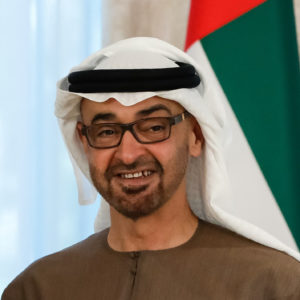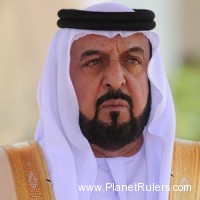Sheikh Mohamed bin Zayed bin Sultan Al Nahyan, President of the United Arab Emirates
 Sheikh Mohamed bin Zayed bin Sultan Al Nahyan GCMG (born 11 March 1961), colloquially known by his initials as MBZ, is the third president of the United Arab Emirates and the ruler of Abu Dhabi. He is seen as the driving force behind the UAE’s interventionist foreign policy and is a leader of a campaign against Islamist movements in the Arab world.
Sheikh Mohamed bin Zayed bin Sultan Al Nahyan GCMG (born 11 March 1961), colloquially known by his initials as MBZ, is the third president of the United Arab Emirates and the ruler of Abu Dhabi. He is seen as the driving force behind the UAE’s interventionist foreign policy and is a leader of a campaign against Islamist movements in the Arab world.
In January 2014, when his half-brother Sheikh Khalifa, the president of the UAE and ruler of Abu Dhabi, suffered a stroke, Mohamed became the de facto ruler of Abu Dhabi, controlling almost every aspect of UAE policymaking. He was entrusted with most day-to-day decision-making of the emirate of Abu Dhabi as the crown prince of Abu Dhabi. Academics have characterized Mohamed as the strongman leader of an authoritarian regime. In 2019, The New York Times named him as the most powerful Arab ruler and one of the most powerful men on Earth. He was also named as one of the 100 Most Influential People of 2019 by Time. After the death of Sheikh Khalifa on 13 May 2022, Mohamed became the ruler of Abu Dhabi; he was elected to the presidency of the United Arab Emirates the next day.
Mohamed is married to Sheikha Salama bint Hamdan Al Nahyan. They married in 1981. They have nine children together, four sons and five daughters. A lifelong fan of falconry, Mohamed established the Mohamed bin Zayed Falconry and Desert Physiognomy School with the goal of promoting and sustaining the ancient tradition by teaching it to new generations of Emiratis. He himself learned the practice from his father.
Source: https://en.wikipedia.org/wiki/Mohamed_bin_Zayed_Al_Nahyan
Sheikh Khalifa bin Zayed Al Nahyan, Former President of the United Arab Emirates (died on May 14, 2022)
 HH Sheikh Khalifa bin Zayed Al Nahyan, Ruler of Abu Dhabi, was elected as the new President of the United Arab Emirates on 3rd November, to succeed his father, the late HH Sheikh Zayed bin Sultan Al Nahyan.
HH Sheikh Khalifa bin Zayed Al Nahyan, Ruler of Abu Dhabi, was elected as the new President of the United Arab Emirates on 3rd November, to succeed his father, the late HH Sheikh Zayed bin Sultan Al Nahyan.
HH Sheikh Khalifa has committed himself to continue in the footsteps of his late father, a task that he has set himself for nearly thirty years, since he first became Crown Prince of Abu Dhabi in 1969.In a statement issued in 1990, Sheikh Khalifa said: “My father is my teacher. I learn something from him every day, follow his path and absorb from him his values, and the need for patience and prudence in all things.”
Sheikh Khalifa was born in the inland oasis-city of Al Ain in 1948, where he went to school.
On 18th September 1966, following his father’s assumption of the post of Ruler of Abu Dhabi, Sheikh Khalifa was appointed as Ruler’s Representative in the Eastern Region of Abu Dhabi and as Head of the Courts Department in Al Ain.
On 1st February 1969, Sheikh Khalifa was nominated as the Crown Prince of Abu Dhabi, this being followed on 2nd February 1969 by his appointment as the Head of the Abu Dhabi Department of Defence, in which post he oversaw the building up of the Abu Dhabi Defence Force, ADDF, which later became the nucleus of the UAE Armed Forces.
On 1st July 1971, as part of the restructuring of the Government of the Emirate, Sheikh Khalifa was appointed as Prime Minister of Abu Dhabi and Minister of Defence and Finance.On 23rd December 1973, Sheikh Khalifa assumed the post of Deputy Prime Minister in the second UAE Federal Cabinet.
Shortly afterwards, when the Cabinet of Abu Dhabi Emirate was dissolved, as part of the process of strengthening the institutions of the UAE federation, Sheikh Khalifa was appointed, on 20th January 1974, as the first Chairman of the Abu Dhabi Executive Council, which replaced the Emirate’s Cabinet.
Under his direction, and in accordance with the instructions of HH Sheikh Zayed, the Executive Council oversaw the implementation of a wide-ranging development programme in Abu Dhabi, including the construction of housing, water supplies and other essential services, roads and the general infrastructure that led to the emergence of the city of Ab uDhabi as the modern city that it is today.
Of particular importance in terms of ensuring that citizens were able to benefit from the country’s increasing wealth was the establishment by Sheikh Khalifa in 1981 of the Abu Dhabi Department of Social Services and Commercial Buildings, charged with the provision of loans to citizens for construction. Over Dh 35 billion have so far been lent by this Department, with over 6000 multi-storey buildings being constructed throughout the Emirate.
The establishment of the Department, popularly known as the ‘Khalifa Committee’, followed another decision taken by Sheikh Khalifa in 1979 to alleviate the burden on citizens of the repayment of loans from the commercial banks. This involved a fixing of the interest rate payable by citizens of loans for construction at 0.5 per cent, with the balance of the interest being charged by the banks being paid by Government.
A further step to ensure that citizens were able to build the properties that they needed, both for residential and for investment purposes, came with the creation by Sheikh Khalifa of the Private Loans Authority, early in 1991. By July of that year, only a few months after the Authority was created, 11,034 citizens had received loans amounting to Dh 11.15 billion.
The continuing growth of the population, and rising costs, led to a further step in September 2000, when Sheikh Khalifa instructed that the total amount of individual house-building loans should be raised from Dh 900,000 to Dh 1.2 million.
President HH Sheikh Khalifa has also been involved extensively in other areas of the country’s development.
In May 1976, following the unification of the armed forces of the Emirates, Sheikh Khalifa was nominated as Deputy Supreme Commander of the UAE Armed Forces. in this capacity, he devoted much attention to the building up of the country’s defensive capability, through the establishment of many military training institutions and through the procurement of the latest military equipment and training.
Earlier this year, he noted: “the United Arab Emirates is keen that its armed forces are on a par with developments in the military sphere elsewhere in the world, in particular in terms of planning, organisation, weaponry and training. We shall continue to strive for this, so that our armed forces attain the maximum efficiency possible.”
Sheikh Khalifa has held a number of other top posts in the Abu Dhabi Government. Since the late 1980s, for example, he has been Chairman of the Supreme Petroleum Council, in which capacity he has also sought to ensure that the country diversifies its economy away from reliance on oil and gas production. In particular, he has worked to develop the UAE’s downstream petrochemicals and industrial complex at Ruwais.
He is also Chairman of the Abu Dhabi Fund for Development, ADFD, which overseas the country’s overseas aid programme, from which over 40 countries have now benefited, the Abu Dhabi Investment Authority, ADIA, which manages the financial reserves and investment, and the Environmental Research and Wildlife Development Agency, ERWDA.
Externally, Sheikh Khalifa is a strong supporter of the six-member Gulf Co-operation Council, believing that the success and achievements of this body reflect the depth of understanding reached amongst its leaders. A keen supporter of the regional policy of HH Sheikh Zayed, in particular in terms of promoting solidarity between the Arab states, Sheikh Khalifa is firmly committed to support of the Palestinian people and also of moves designed to promote and restore stability in Iraq.
His key objectives as the new President of the United Arab Emirates, he says, will be to continue on the path laid down by his father. In particular, he says, he will continue with the ‘open door’ policy and with the practice of holding regular consultations with the country’s citizens, so that he may become aware of, and follow up on, their needs and concerns.

